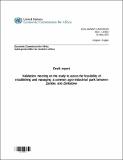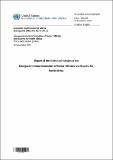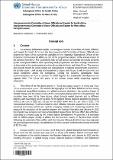| dc.description.abstract | An inclusive green economy approach can help facilitate achievement of the goals of structural transformation in African through accelerating and promoting sustainable industrial development, boosting renewable energy production, availability and efficiency as well as increasing sustainable agricultural productivity and production. Within this context, an inclusive green economy offers an alternative paradigm shift to simultaneously address the above challenges through proactively aligning the macroeconomic policies of the state with environmental and social policy goals. Inclusive green economy is seen as an alternative to the non-inclusive and no sustainable growth path to a sustainable transformation of economies. Therefore, sound macroeconomic policies are needed to support the inclusive green growth vision. The twin objectives of orthodox macroeconomic policy, i.e., keeping inflation and government deficit low, have failed to engender structural changes in Africa. While achieving consistent policy objectives in the areas of inflation, exchange rates, interest rates, external balances, growth in monetary aggregates and labour market and social outcomes remain a challenge, it is critical to ensure that macroeconomic policies support the implementation of national development plans, and green economy strategies in particular. A favourable macroeconomic environment is critical for the success of a green economy. Also, the macroeconomic policies of a country can be influenced by a green economy to adequately address environmental and social policy objectives. The good practices, success factors and lessons learned from Africa on fiscal, monetary and financial policies that have fostered the development of an inclusive green economy are presented. The case studies presented here demonstrate that careful consideration of these good practice and lessons learned would help facilitate design and implementation of macroeconomic framework and reforms to enhance implementation of inclusive green economy interventions. In addition, there are some challenges presented here such as dealing with unintended impacts that policy makers and responsible government agencies should carefully address in the designing and implementation of macroeconomic framework, reforms and inclusive green economy interventions. | en |
| dc.title | Macroeconomic Frameworks for an Inclusive Green Economy in Africa | en |
| uneca.subject.fulltaxonomy | UNBIS::ECONOMIC DEVELOPMENT AND DEVELOPMENT FINANCE::ECONOMIC CONDITIONS | en |
| uneca.subject.fulltaxonomy | UNBIS::ECONOMIC DEVELOPMENT AND DEVELOPMENT FINANCE::ECONOMIC CONDITIONS::ECONOMIC POLICY | en |
| uneca.subject.fulltaxonomy | UNBIS::ECONOMIC DEVELOPMENT AND DEVELOPMENT FINANCE::DEVELOPMENT::ECONOMIC DEVELOPMENT | en |
| uneca.subject.fulltaxonomy | UNBIS::NATURAL RESOURCES AND THE ENVIRONMENT::RESOURCES (GENERAL)::NATURAL RESOURCES | en |
| uneca.subject.fulltaxonomy | UNBIS::NATURAL RESOURCES AND THE ENVIRONMENT::RESOURCES (GENERAL)::NATURAL RESOURCES DEVELOPMENT | en |
| uneca.subject.fulltaxonomy | UNBIS::NATURAL RESOURCES AND THE ENVIRONMENT::RESOURCES (GENERAL)::NATURAL RESOURCES POLICY | en |
| uneca.subject.fulltaxonomy | UNBIS::NATURAL RESOURCES AND THE ENVIRONMENT::ENVIRONMENT::ECOLOGY | en |
| uneca.subject.fulltaxonomy | UNBIS::NATURAL RESOURCES AND THE ENVIRONMENT::ENVIRONMENT | en |
| uneca.subject.fulltaxonomy | UNBIS::NATURAL RESOURCES AND THE ENVIRONMENT::ENVIRONMENT::ENVIRONMENTAL ECONOMICS | en |
| uneca.subject.fulltaxonomy | UNBIS::NATURAL RESOURCES AND THE ENVIRONMENT::ENVIRONMENT::SUSTAINABLE DEVELOPMENT | en |
| uneca.subject.fulltaxonomy | UNBIS::ECONOMIC DEVELOPMENT AND DEVELOPMENT FINANCE::ECONOMIC THEORY::MACROECONOMICS | en |
| uneca.creatorCorporate.fulltaxonomy | Corporate Authors::United Nations. Economic Commission for Africa. African Institute for Economic Development and Planning(IDEP) | en |
| ags.creatorCorporate | United Nations. Economic Commission for Africa. African Institute for Economic Development and Planning(IDEP) | en |
| ags.subjectThesaurus | ECONOMIC CONDITIONS | en |
| ags.subjectThesaurus | ECONOMIC POLICY | en |
| ags.subjectThesaurus | ECONOMIC DEVELOPMENT | en |
| ags.subjectThesaurus | NATURAL RESOURCES | en |
| ags.subjectThesaurus | NATURAL RESOURCES DEVELOPMENT | en |
| ags.subjectThesaurus | NATURAL RESOURCES POLICY | en |
| ags.subjectThesaurus | ECOLOGY | en |
| ags.subjectThesaurus | ENVIRONMENT | en |
| ags.subjectThesaurus | ENVIRONMENTAL ECONOMICS | en |
| ags.subjectThesaurus | SUSTAINABLE DEVELOPMENT | en |
| ags.subjectThesaurus | MACROECONOMICS | en |
| ags.descriptionNotes | This Web-based course, held between 01 July and 04 August 2019, i.e. 4 weeks of learning, includes 7 training modules. Each module contains interactive lessons that provide the basic content around the theme of that .module. | en |
| ags.publisherPlace | Dakar | en |
| ags.publisherName | UN, IDEP | en |
| ags.rightsStatement | ©2019, Section KM & E-Leraning IDEP. All Rights reserved.. | en |
| dc.date.accessioned | 2020-10-21T03:36:08Z | |
| dc.date.available | 2020-10-21T03:36:08Z | |
| dc.date.issued | 2019 | |
| dc.identifier.uri | https://hdl.handle.net/10855/43822 | |
| uneca.workflow.processed | true | |
| uneca.language.supported | en | |
| dc.format.extent | 130 p.:ill. | |
| dc.language | eng | |
| dc.type | Technical paper | |
| ags.creatorCorporate | United Nations. Economic Commission for Africa. African Institute for Economic Development and Planning(IDEP) | |
| ags.subjectThesaurus | ECONOMIC CONDITIONS | |
| ags.subjectThesaurus | ECONOMIC POLICY | |
| ags.subjectThesaurus | ECONOMIC DEVELOPMENT | |
| ags.subjectThesaurus | NATURAL RESOURCES | |
| ags.subjectThesaurus | NATURAL RESOURCES DEVELOPMENT | |
| ags.subjectThesaurus | NATURAL RESOURCES POLICY | |
| ags.subjectThesaurus | ECOLOGY | |
| ags.subjectThesaurus | ENVIRONMENT | |
| ags.subjectThesaurus | ENVIRONMENTAL ECONOMICS | |
| ags.subjectThesaurus | SUSTAINABLE DEVELOPMENT | |
| ags.subjectThesaurus | MACROECONOMICS | |
| ags.subjectClassification | 02.02.00 ECONOMIC CONDITIONS | |
| ags.subjectClassification | 03.02.00 RESOURCES (GENERAL) | |
| ags.availabilityNumber | b000002 | |
| ags.availabilityNumber | 2019 | |
| ags.availabilityLocation | IDEP | |
| ags.rights.termsofuse | public | |
| ags.JN | b000002 | |




